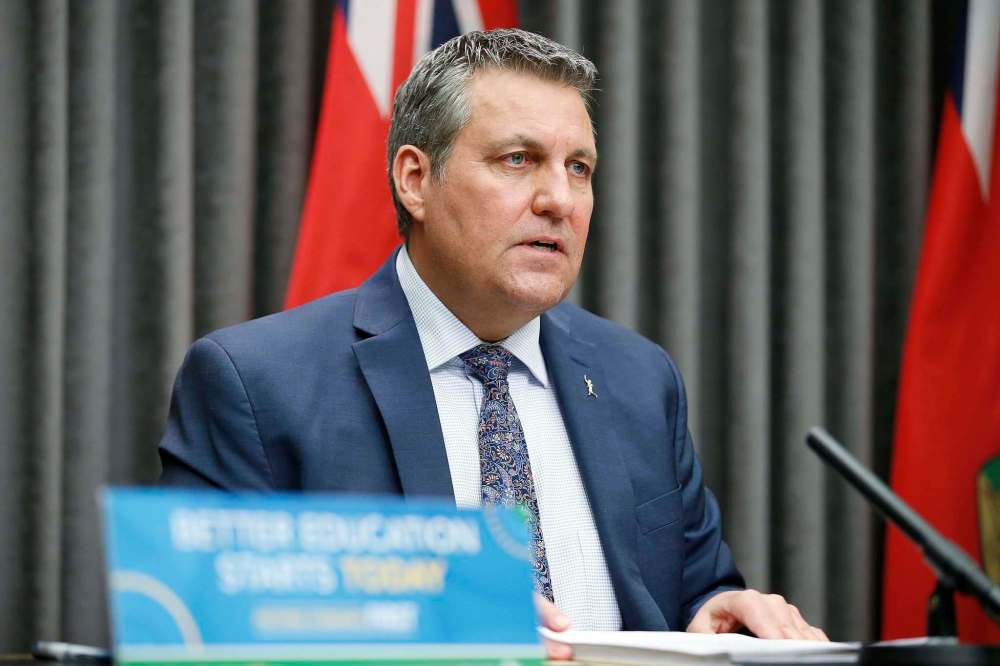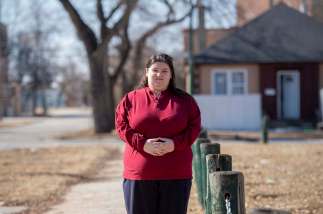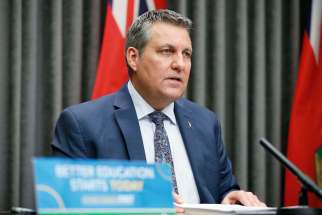Sensitive-content clause is a backward step
Read this article for free:
or
Already have an account? Log in here »
To continue reading, please subscribe:
Monthly Digital Subscription
$0 for the first 4 weeks*
- Enjoy unlimited reading on winnipegfreepress.com
- Read the E-Edition, our digital replica newspaper
- Access News Break, our award-winning app
- Play interactive puzzles
*No charge for 4 weeks then price increases to the regular rate of $19.00 plus GST every four weeks. Offer available to new and qualified returning subscribers only. Cancel any time.
Monthly Digital Subscription
$4.75/week*
- Enjoy unlimited reading on winnipegfreepress.com
- Read the E-Edition, our digital replica newspaper
- Access News Break, our award-winning app
- Play interactive puzzles
*Billed as $19 plus GST every four weeks. Cancel any time.
To continue reading, please subscribe:
Add Free Press access to your Brandon Sun subscription for only an additional
$1 for the first 4 weeks*
*Your next subscription payment will increase by $1.00 and you will be charged $16.99 plus GST for four weeks. After four weeks, your payment will increase to $23.99 plus GST every four weeks.
Read unlimited articles for free today:
or
Already have an account? Log in here »
Hey there, time traveller!
This article was published 09/04/2021 (1706 days ago), so information in it may no longer be current.
For legislation touted as the future of schooling in Manitoba, the Education Modernization Act holds on to some pretty regressive ideas about curriculum propriety.
The “potentially sensitive content” clause in Bill 64, which was unveiled by Education Minister Cliff Cullen last month, will require the new education authority to write up an official province-wide policy ensuring families are given notice and the chance to opt out of health and phys-ed lessons involving human sexuality, substance use and abuse prevention and personal safety.
This kind of policy isn’t new. Schools are currently allowed to create their own definitions of sensitive content, and caregivers are allowed to ask for student exclusions based on family, religious or cultural reasons. However, leaning into the way things have always been done doesn’t bode well for public education and society as a whole.

Parents should be aware of what their children are learning in school, and religious freedom matters; but allowing families to opt out of lessons designed to teach students about their bodies, sexuality and general safety is inherently risky business.
A 2018 UNESCO study found that school-based sex-ed programs help delay the initiation of intercourse, reduce risky behaviour and increase the use of condoms and contraception; while abstinence-only programs are ineffective in their stated objective. Comprehensive sex education that includes conversations about gender identity, human rights, consent and healthy relationships — areas Manitoba’s curricula are already lacking — can also improve general well-being and reduce gender-based and intimate-partner violence.
But, according to this province’s Progressive Conservative government, “sensitive content” extends beyond sex-ed to include substance use, abuse prevention and personal safety. Why these topics, which would empower students with knowledge to protect themselves in potentially dangerous situations, are considered controversial is simply baffling.
To add insult to injury, teachers and subject experts are noticeably absent from the discussion.
A major problem with creating a blanket policy regarding sensitive content is that we don’t have an agreed-upon definition for what content is deemed sensitive. It’s a highly subjective question whose answer would, under Bill 64, be decided by a government-appointed body, opening the door for political pressures and pandering.
Consultation with parent-run school community councils will be mandatory, but whether their input makes it to the final draft is yet to be seen.
To add insult to injury, teachers and subject experts are noticeably absent from the discussion. For someone who so frequently refers to himself as a former teacher, Premier Brian Pallister’s apparent distrust in educators’ ability to inform education policy and deliver appropriate content within their own classrooms is rather alarming.
The “potentially sensitive content” clause has drawn fire from critics who expect the opt-out policy to further marginalize the LGBTTQ+ community.
“People are entitled to have whatever ethical or moral or religious beliefs that they want to have, but the idea that they don’t have to learn and they don’t have to understand and treat humans with basic respect — it seems ridiculous to me,” Winnipeg teacher Patrick McGuire told the Free Press.
Last but not least, trying to shield kids from sensitive content in the internet age is a zero-sum game. Instead of letting kids fumble through questionable online information, we should be satisfying their natural curiosity in a safe, structured way.
The purpose of a public school system is to prepare young people for life in a democratic and diverse world. For many, knowledge gleaned from health education will be much more useful and applicable in adulthood than the formulas memorized in pre-calculus class. As such, those lessons shouldn’t be optional.













